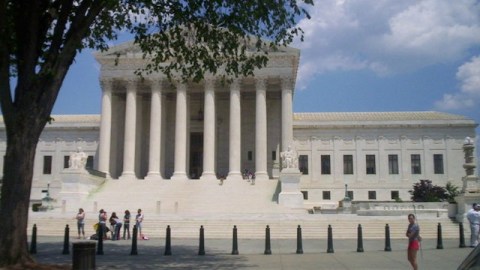Why Overturning Health Care Reform Would Be a Mistake

President Obama said Monday that overturning the Affordable Care Act would be “an unprecedented, extraordinary step.” But by all accounts oral argument in the Supreme Court went badly for supporters of Obama’s health care law. In one exchange, Justice Anthony Kennedy—who is widely expected to be the deciding vote—suggested that he doesn’t believe the government’s argument that the law isn’t an unprecedented exercise of federal power. With Kennedy skeptical, it’s entirely possible that the court will take the extraordinary step of overturning the law in whole or in part.
There’s a reason why both conservative and liberal legal experts assumed the law was constitutional when it originally passed. In spite of its broad scope, it didn’t seem fundamentally different from other laws that the court had previously declared constitutional. If it seems more problematic now that’s in large part the result of the partisan political campaign against it.
After all, the Constitution gives Congress the power to make laws that are “necessary and proper” to regulating commerce among the states. The health care crisis is arguably exactly the kind of issue that the federal government was meant to address, since no state acting on its own can do much to lower health care costs. The Supreme Court has generally given Congress broad leeway to determine what laws are necessary and proper, on the idea that it’s not the court’s place to determine how Congress should legislate. In 1941 the court held in Wickard v. Filburn that the federal government could regulate the growing of wheat for personal consumption as a way of stabilizing national commodity prices. More recently the court ruled in Gonzales v. Raich that the government could on similar grounds criminalize the growth of marijuana for personal medicinal use, even in states where the medicinal use of marijuana was legal.
Because the law already requires hospitals to provide emergency care to everyone regardless of their ability to pay, people who don’t have health insurance raise the cost of medical care for the rest of us. The federal government is also already—and apparently unproblematically—heavily involved in managing the national market for health care through Medicare and Medicaid. The main difference between the new health care law and these programs is that the government would require people to buy their own insurance rather than pay the government for it directly. Likewise, if the health care mandate consisted of a tax break for people who buy health insurance—something the government already does in a myriad of other areas—rather than a fine people for who don’t get insurance, the economic effect would be exactly the same. Linda Greenhouse, who won a Pulitzer Prize for her coverage of the Supreme Court, wrote that “The constitutional challenge to the law’s requirement for people to buy health insurance is—specifically, the argument that the mandate exceeds Congress’s power under the Commerce Clause—is rhetorically powerful but analytically so weak that it dissolves on close inspection.”
Overturning the Affordable Care Act would therefore seem to mean discarding settled law to invalidate the once-in-a-generation compromise of a democratically-elected Congress. There are good reasons for courts to respect their own precedents. If we can’t be sure that the law is what the courts have said it is, it is hard to know how to comply with it. In this case, Congress had every reason when the health care act was passed to believe that it was constitutional—when asked if it was constitutional Nancy Pelosi’s response was a surprised “Are you serious?” Like most constitutional lawyers, Pelosi quite reasonably believed was unproblematic.
As Big Think’s Will Wilkinson writes, this kind of “judicial activism” isn’t necessarily a bad thing. Always deferring to precedent would make bad decisions a permanent part of our constitutional law. It would still be legal to provide “separate, but equal” facilities for blacks and for whites. The truth is that we call a decision “activist” only when we think it’s wrong. If a precedent was wrongly decided, it was wrongly decided. Nor should the courts necessarily defer to the will of the legislature. The law is not simply whatever the majority happens to think at a given moment. Indeed, the Constitution was designed to limit the legal power of the majority. The court certainly shouldn’t be too quick to reverse itself and overturn acts of Congress, but it should still be able to rectify its own mistakes.
Many jurists do think that the Commerce Clause has been interpreted too expansively in cases like Wickard, although the Supreme Court has continued to affirm its broad interpretation in decision after decision. At issue are the limits of the Congress’ power to regulate commerce. The Commerce Clause was clearly not meant to give Congress unlimited power to do whatever it wants. But it wouldn’t be hard to justify any law—even a hypothetical law forcing people to eat broccoli—in terms of its effect on commerce. That’s why oral argument centered on whether the mandate to buy health care is compatible with any limits on the congressional power.
The truth is it’s not hard to find a limiting principle that’s compatible with the mandate but not with forcing people to eat their vegetables. As Jeffrey Rosen argues, the most compelling principle is that Congress has the power to regulate activity that is truly national, “in the sense that states aren’t able to effectively regulate the activity on their own.” Rosen draws on Duke law professor Neil S. Sigel’s view that the Commerce Clause is best understood as a solution to “the collective action problems that the nation faced under the Articles of Confederation.” According to this view, Congress doesn’t have the power to regulate issues states can effectively address locally—like domestic abuse or gun violence (or even broccoli consumption)—but does have the power to regulate activities whose effects meaningfully spill over across state lines.
Health care is a truly national issue because—as Massachusetts has found out—any state that attempts to address health care prices has to subsidize the uninsured from other states who move there to take advantage of the benefits it offers. As Rosen points out, the court upheld Social Security in part on the basis of precisely this logic. Writing for the majority in Helvering v. Davis, Justice Benjamin Cardozo explained that “A system of old age pensions has special dangers of its own, if put in force in one state and rejected in another. The existence of such a system is a bait to the needy and dependent elsewhere, encouraging them to migrate and seek a haven of repose. Only a power that is national can serve the interests of all.”
Overturning the Affordable Care Act would be a shame. Rising health care costs are depressing our standard of living. Already millions of Americans have no way of affording the costs of dealing with medical emergencies. The Affordable Care Act may not be a great law, but it is the only major health care reform bill Congress has been able to pass in forty years of trying. Republicans don’t seem to offer any real alternative. Medical tort reform may be a good idea on its own, but it isn’t going to solve the larger problem. The truth is that until recently requiring people to buy health insurance through the market was the Republican alternative. Democrats generally preferred a single-payer “public option” modeled on Medicare. It was only when a Democratic president began to support the mandate that Republicans decided it constituted an unprecedented assault on freedom. One way or another Congress needs to the power to address the health care issue—something that the framers of the Constitution already knew full well.
Supreme Court image from The Agency





